DUBAI: The neo-Ottoman foreign policy of President Recep Tayyip Erdogan that has laid waste to large expanses of the Arab world in recent years, now threatens to set the South Caucasus ablaze. Ankara ratcheted up its divisive rhetoric as a second day of heavy fighting between Azerbaijani and Armenian forces, in which at least 21 were killed and hundreds wounded, raised fears of an all-out war between the longtime foes.
While the US added its voice to a chorus of appeals for calm and a peaceful solution, Turkish officials sounded eager to give war a chance. Although not unexpected from a government known for its denial of the Ottoman-era genocide of ethnic Armenians, the fulminations of the Turks are strongly evocative of a political pathology that led to the massacre of 1.5 million ethnic Armenians between 1915 and 1923.
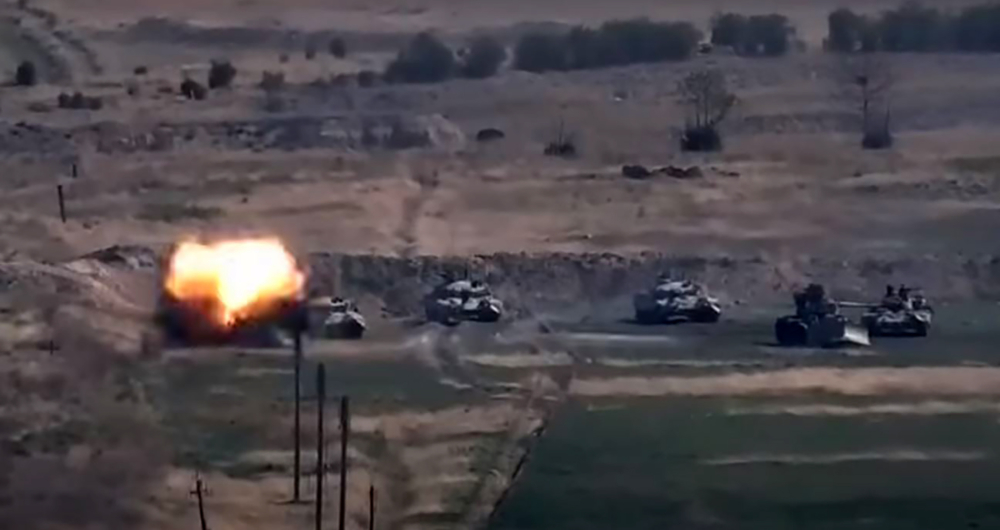
Clashes have raged on after erupting on Sunday along the front lines of Nagorno-Karabakh. (AFP)
“We will support our Azerbaijani brothers with all our means in their fight to protect their territorial integrity,” Hulusi Akar, Turkey’s defense minister, thundered in a statement, adding: “The greatest obstacle to peace and stability in the Caucasus is Armenia’s aggression, and it should give up this aggression which will throw the region into fire.”
Clashes have raged on after erupting on Sunday along the front lines of Nagorno-Karabakh, a mostly mountainous ethnic Armenian region that declared its independence and triggered a war in the early 1990s that claimed 30,000 lives, but is still considered part of Azerbaijan by the international community. The territorial dispute is at the root of the deadly fighting which flared up in 2016 and again earlier this year.
In a series of tweets, Thomas de Waal, a senior fellow at Carnegie Europe who specializes in the Caucasus, said: “Azerbaijan, the losing side in the conflict of the 1990s, is the side with an incentive to use military aggression to reshape the facts on the ground. This is almost certainly what they did on Sunday. And yes, they probably picked a moment when they thought the world was distracted.
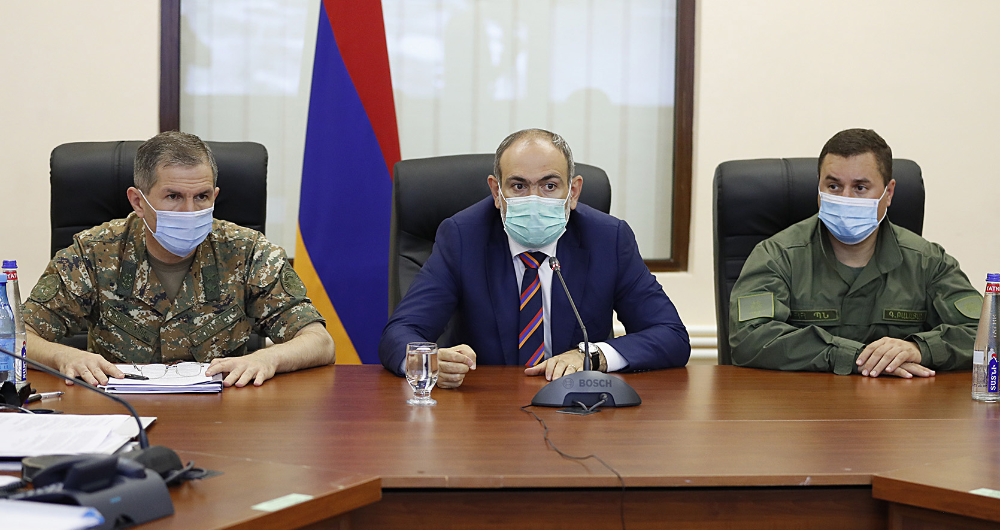
Armenian Prime Minister Nikol Pashinyan meeting with top military officials in Yerevan on Sunday. (AFP)
“But this does not mean the Armenian side is peace-loving. For a long time, they have not agreed to substantial talks about the conflict. The way they call territory they occupied outside Nagorno-Karabakh in the 1990s ‘liberated’ makes them ‘passive aggressive,’ a co-sponsor of violence.”
Analysts say the religious fault-lines exposed by the Armenia-Azerbaijan conflict have created an opening in the South Caucasus for influence projection by President Erdogan, whose expansionist foreign policy panders to a constituency encompassing both hardcore Islamists and secular ultra-nationalists.
On Monday, Erdogan amplified the message of his defense minister, saying on Twitter: “While I call on the Armenian people to take hold of their future against their leadership that is dragging them to catastrophe and those using it like puppets, we also call on the entire world to stand with Azerbaijan in their battle against invasion and cruelty.”
Echoing their leader, some journalists in Turkey have called for the use of military force against Armenia to protect Azerbaijani interests. Ibrahim Karagul, the chief editor of the pro-government newspaper Yenisafak, advised the dropping of a “missile in the middle of (Armenia’s capital) Yerevan” to show Turkish solidarity with Azerbaijan, adding: “In this way, we can build a Caucasus Islam Army within 100 years.”
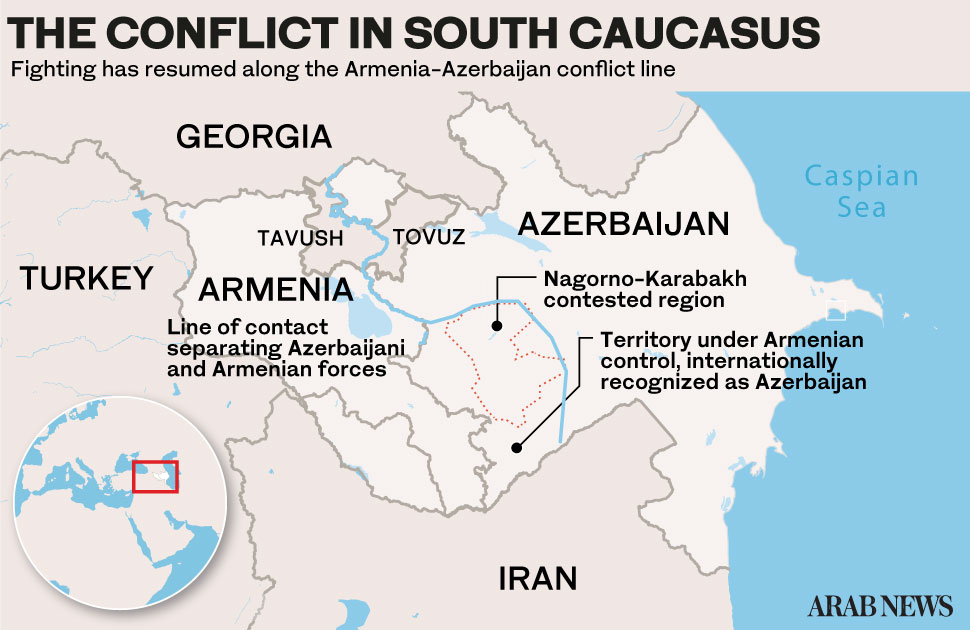
Armenian officials say some Turkish troops stayed back after they went to Azerbaijan for large-scale military drills in August. Syrian Kurdish YPG militia sources report that hundreds of Syrian mercenaries have been moved through Turkey’s southeastern province of Kilis. Elements of the Syrian National Army (SNA) claim that up to “1,000 jihadists” in their ranks have been deployed in Azerbaijan as mercenaries.
Hikmet Durgun, a Turkish journalist, has said SNA militants have likely been deployed to Nagorno-Karabakh, with others speculating that some of the mercenaries were drawn from Turkish-backed Syrian factions on the Libyan battleground. The Syrian mercenaries were reportedly recruited through an intermediary of the Turkish intelligence agency with a promised monthly wage of $2,000, and transported via Turkish military cargo planes to the Azeri cities of Ganja and Baku using Georgian airspace.
“About a month ago, rumors spread on WhatsApp among SNA fighters that they can register to go to Azerbaijan. Many registered over WhatsApp, others apparently through offices in the Turkish-controlled areas. The fighters registered due to the enticing rumored salaries of $2K-$2.5K,” Elizabeth Tsurkov, a fellow at the Center for Global Policy, said on Twitter.
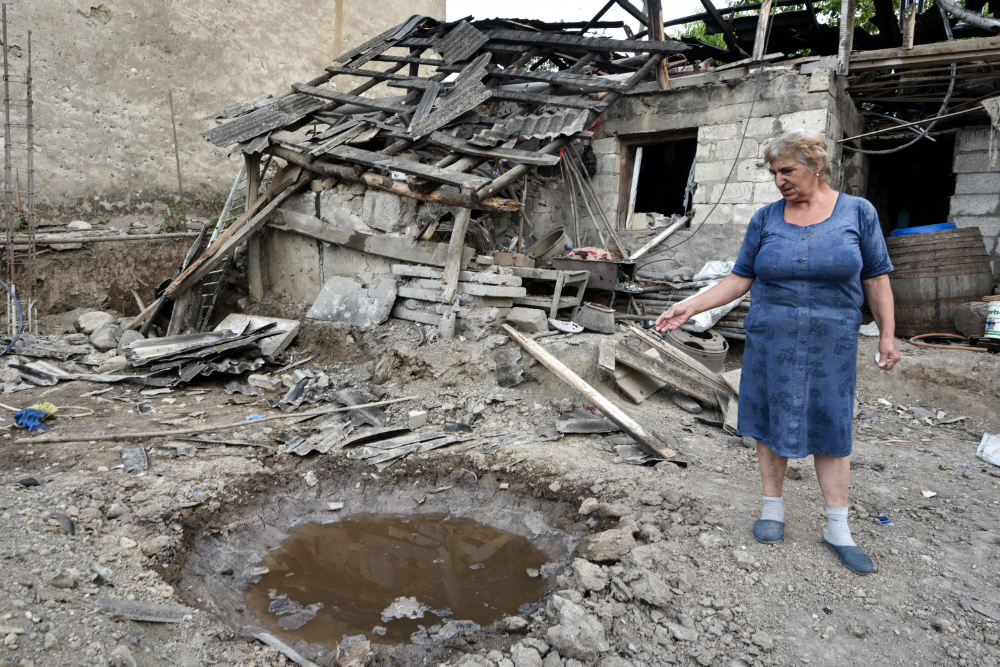
Lida Chobanyan in front of her house which suffered damage after shelling. (AFP/File)
Idlib Post, a news website, published a photo purporting to show a group of 300 SNA fighters departing from the countryside of Aleppo for Azerbaijan via Turkey. The men were mainly selected from the Hamza division, a rebel group that has acted as a proxy force for the Turks in operations in northern Syria, according to Lindsey Snell, an award-winning journalist.
An aide to Azerbaijan’s President Ilham Aliyev vigorously denied on Monday that Turkey had sent fighters from Syria to the South Caucasus.
“Rumours of militants from Syria allegedly being redeployed to Azerbaijan is another provocation by the Armenian side and complete nonsense,” said the aide, Khikmet Gadzhiev.
However, Paul Antonopoulos, a regional expert, thinks there is strong evidence that Turkey has relocated militants from northern Syria and will likely use them in the same way that they were used in Libya.
“Turkey will unequivocally support Azerbaijan in every possible way they can, bar a direct military intervention. Turkey’s strong diplomatic support for Azerbaijan will continue, as well as material and intelligence aid,” he told Arab News.
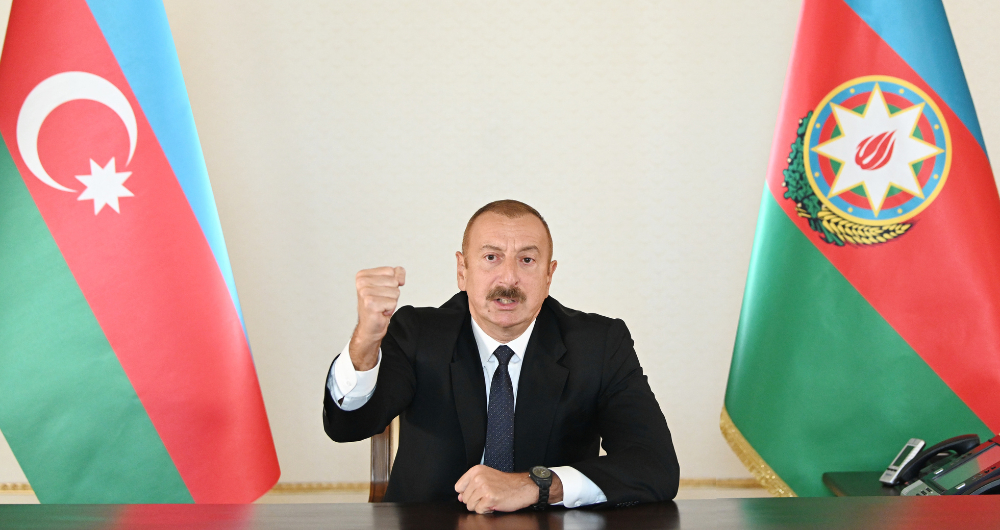
Azerbaijan’s President Ilham Aliyev. (AFP)
“I would estimate that when there is enough international pressure to end the hostilities, Russia and Turkey will mediate together to bring about a temporary end to the hostilities.
“Armenia is a member state of the Collective Security Treaty Organization, a Eurasian military alliance led by Russia. This would likely deter Turkey from directly intervening militarily and thus the conflict will be contained between Armenia and Azerbaijan.”
Against this backdrop of soaring geopolitical tensions, Carnegie Europe’s De Waal believes, ultimately, it will be up to the Armenians and Azerbaijanis “to make the strategic decision to deal with one another and follow a plan that involves concessions” and leads to peace.
“That will happen one day — but bloodshed delays that day by creating more mutual insecurity and fear,” he said on Twitter.


























